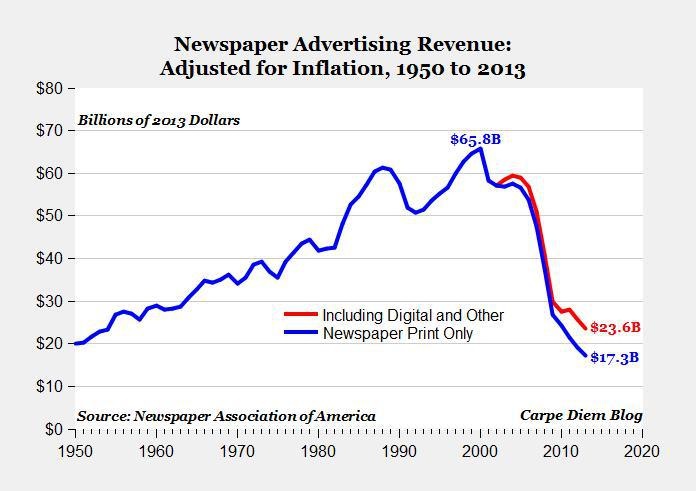Journalism’s transformation in the digital age has been incredible to watch, and we’re far from it shaking out. Measured by traditional advertising dollars flowing into print media, the industry has been decimated with revenue falling to levels not seen since 1950. Have you ever seen a drop-off so steep?
I thought we had it bad in the music industry. Our global revenue of recorded music went from almost $30B in 1999 to $15B today, but it’s nothing like the precipitous fall of newspaper advertising. In the music industry we have reached the nadir of the industry free-fall and are finally on the upswing. The real debate is if we’ll be moving beyond our historic highs from 1999. The music industry will go well beyond that point. People are using more services to enjoy recorded music, and they can all track, report, and monetize all the attention we giving to it. This is compounded by the growing level of access online and across devices. Everyone can tell that music has become more pervasive in our lives. The music industry is truly a $100B business trapped in a $16B shell today. When looking at journalism, however, I do not see a similar leveling out nor can I get a sense for how big the new models will be. I’m not even sure what those winning models are or how journalists will adapt and evolve like artists have in the music industry.
It’s easy to revel in the web’s democratizing power of real-time information access. Anyone can gather information, report on facts, and publish an informed viewpoint nearly instantaneously. More often than not, these atomic units of journalism are not sufficiently researched or well written, but they deliver on our immediate need for news and information. Traditional newsrooms can’t compete and are closing shop. Clay Shirky points this out poignantly in his article Last Call, which is highly recommended reading if you want a brutal awakening on the realities of the journalism industry. Clay gives a heartfelt perspective on the impact of newspapers closing and journalists losing their jobs.
The death of newspapers is sad, but the threatened loss of journalistic talent is catastrophic. If that’s you, it’s time to learn something outside the production routine of your current job. It will be difficult and annoying, your employer won’t be much help, and it may not even work, but we’re nearing the next great contraction. If you want to get through it, doing almost anything will be better than doing almost nothing.
The question is how journalists will survive? The best at their craft play an essential role in shaping our collective knowledge and culture. Their insights are informed by a vantage point not many are able to achieve. Most have a mastery of the written word that inspires us into action or sends us into deep reflection on relevant topics and issues.
Mathew Ingram‘s take is that we’re in a golden age of journalism. He recently published a great response to the recent articles on the decline of the print media business:
Some argue that the rise of the internet has destroyed — or severely crippled — journalism, but all it has really done is disrupted traditional mass-media business models. Journalism itself has never been healthier, and new players are finding new models. [What many are] complaining about is the failure of a specific business model for funding journalism, not the decline of journalism itself.
As more media is produced than ever before, is there a way to support journalists by letting them earn for their expertise and critical thinking beyond writing articles for publications? Could we tap their knowledge and perspective in a mutually reinforcing way and let them support others in the creative process? Can journalists find income streams detached from declining news organizations and connect directly to others who would benefit from their attention? These are my initial questions as I learn about the journalism industry.
We’re seeing journalists use Fluence as a utility to manage their inbound media submissions, and some are experimenting with letting producers and brands send them media and rough ideas for their thoughts and advice. Can we generate a meaningful income stream for journalists by harnessing their expertise and feedback? How best to help them earn for the value they create beyond writing articles? If done well it could supplement the lives of journalists and other curators so they can continue playing their crucial role as our trusted sources.
I’m keen on tackling these problems given the parallels between journalism and music. Each requires talent and tenacity to do their craft well. Both have been massively impacted positively and negatively by digital and web technologies. Our culture and society thrive when both are supported and appreciated. Reading a cogent article can move you to tears, mobilize you to fight, or can challenge the status quo in a way that changes life forever. We all know the power of music and how an incredible song can bring so much emotion, joy, and energy into our lives. Both move humanity forward and are essential in helping us all connect on a higher level.
